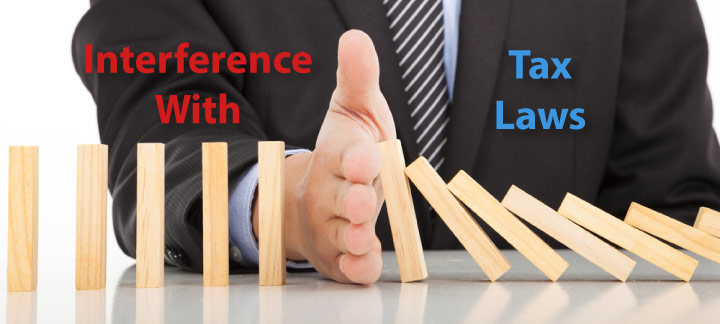Interference with the Administration of Tax Laws
A lesser-known criminal tax offense is called interference with the administration of tax laws. This offense is found in IRC § 7212(a), which prohibits conduct intended to interfere with the administration of tax laws. It specifically provides: “Whoever corruptly or by force or threats of force (including any threatening letter or communication) endeavors to intimidate or impede any officer or employee of the United States acting in an official capacity under this title, or in any other way corruptly or by force or threats of force (including threatening letter or communication) obstructs or impedes, or endeavors to obstruct or impede, the due administration of this title shall [be subject to fines and/or imprisonment].”
How Does the Government Prove Interference with the Administration of Tax Laws?
First, the government does not need to show that the taxpayer was actually successful in creating an adverse impact on an investigation or other governmental function related to the administration of taxes. Instead, “[A]ll that is necessary is that the defendants intended to ‘intimidate or impede’ the IRS officers…” (1). Next, the government does not need to show that the taxpayer used force or threatened to use force, even though traditionally this has been a requirement. IRC § 7212(a) has typically been used when the defendant used force or threatened to use force through a direct or veiled statement or action. However, the language of the statute itself seems to imply that force or threat of force is not actually required: it prohibits conduct that “in any other way corruptly…obstructs or impedes, or endeavors to obstruct or impede, the due administration” of Title 26 (2).
In applying IRC § 7212(a), courts have extended its effects to conduct involving fraudulent activity, or activity that reflects an intent to obtain an improper benefit or advantage. However, there is no real requirement that the evidence establish an intent to obtain an unfair benefit or other advantage over the tax laws. According to the Ninth Circuit, the aim of IRC § 7212(a) is to prohibit attempts by the taxpayer to impede the collection of one’s taxes; the Eleventh Circuit has similarly stated that it is “to prohibit all activities that seek to thwart the efforts of government officers and employees in executing the laws enacted by Congress” (3). The conduct underlying the violation does not have to be inherently illegal, such as bribery, solicitation, or subordination of perjury. Given the broad language of the statute and the judicial interpretation, many schemes to evade or avoid taxes will inherently fall within the reach of the offense.
In fact, the interference with the administration of tax laws charge is often used by the IRS when it is unable to establish the elements of the more serious tax crimes. Many elements which are affirmatively required under the other tax crimes are not required under IRC § 7212(a), which makes the government’s job easier. Proof of a tax deficiency is not required here, but it is required for tax evasion. Under the false statements statute, the government must show the existence of a return or other document subscribed under the penalty of perjury, but the requirement does not exist under IRC § 7212(a). Nor does the statute require a showing of a fraudulent or false return.
Does IRC § 7212(a) Contain a Willfulness Requirement?
Technically, the interference with administration of tax laws statute does not have explicit language requiring willfulness, but the issue has been raised in various court cases. In United States v. Coplan, the Second Circuit approved a jury instruction that stated, “Acting corruptly requires consciousness of wrongdoing.” In doing so, the Court added, “[a]lthough we have previously declined to read a willfulness requirement into § 7212(a), we have held that a substantially similar jury instruction was ‘as comprehensive and accurate as if the word “willfully” was incorporated in the statute.’” (4) However, in United States v. Williamson, the Court rejected the application of a “mens rea” or willfulness requirement. The mens rea standard for willfulness which was established in Cheek, “the voluntary, intentional violation of a known legal duty,” was held to not apply to IRC § 7212(a) because the statute does not mention the word “willfulness.”
How a Tax Attorney Can Help
If you are under investigation by the IRS under the interference with administration of tax laws statute, then you must consult with an experienced tax attorney. San Diego Tax Attorney William D. Hartsock has been successfully helping clients with criminal tax issues since the early 1980s. Mr. Hartsock offers free consultations with the full benefit and protections of attorney client privilege to help people clearly understand their situation and options based on the circumstances of their case. To schedule your free consultation simply fill out the contact form found on this page, or call (858) 481-4844.
Tax Law References
- United States v. Rosnow, 977 F2d 399 (8th Cir. 1992), cert. denied sub nom.
- United States v. Mitchell, 985 F2d 1275, 1279 (4th Cir. 1993).
- United States v. Popkin, 943 F2d 1535 (11th Cir. 1991), cert. denied, 503 US 1004 (1992).
- United States v. Kelly, 147 F3d 172 (2d Cir. 1998).



Comments (0)